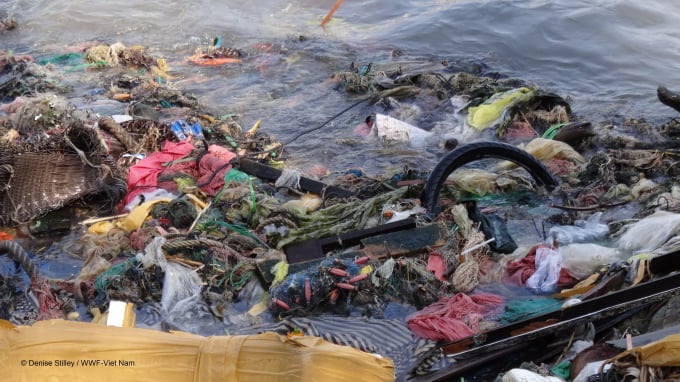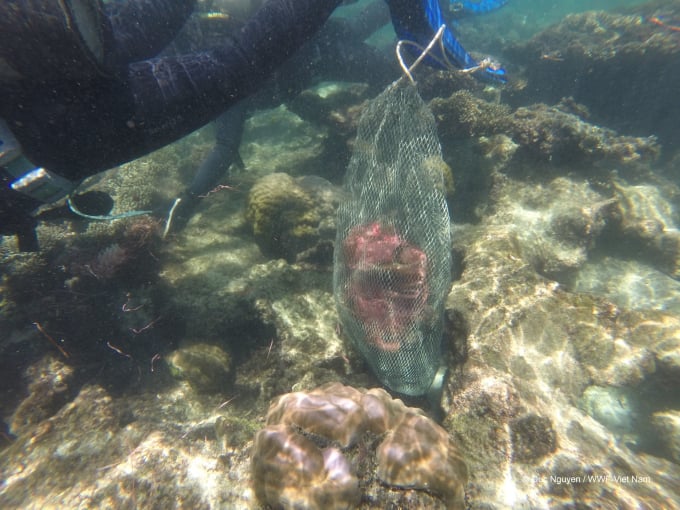November 28, 2025 | 05:35 GMT +7
November 28, 2025 | 05:35 GMT +7
Hotline: 0913.378.918
November 28, 2025 | 05:35 GMT +7
Hotline: 0913.378.918

Coastal plastic waste.
About 3,814 tonnes of plastic waste from fishing vessels have been discharged into the sea each year.
It accounts for 5,6 per cent of the total amount of plastic waste generated by the fishing vessels in the country every year, according to the National Survey for plastic waste discharged from fishing and aquaculture activities into the sea.
The national survey was co-implemented by the World Wildlife Fund (WWF) and the Directorate of Fisheries under the Ministry of Agriculture and Rural Development in 2020 in three provinces of Quang Ninh (in the northern region), Phu Yen (in the central region) and Kien Giang (in the southern region).
The national survey is part of the project "Reducing ocean plastic waste in Viet Nam", operated by the WWF in collaboration with the Ministry of Natural Resources and Environment between October 2019 and December 2023.
The survey’s results showed that there are a total of 64,143 tonnes of plastic waste generated from fishing vessels each year.
The survey says the amount of plastic waste discharged into the sea is mainly from household waste, about 2,288 tonnes each year and partly from fishing gears, which are lost during fishing activities.

Picking up plastic waste to clean the corals in Phu Quoc Beach, Kien Giang Province.
Besides, the survey also says that in aquaculture activities, the plastic waste is discharged from aquafarming infrastructure, including tarpaulin ponds, cages, nets, ropes and buoys.
Especially, in brackish water shrimp intensive farming, the plastic waste generated from tarpaulin, that was used to cover the pond, is very large, the survey says.
It is estimated that about 301,477 tonnes of plastic waste are generated each year from tarpaulin ponds to raise white leg shrimps.
It will be a great pressure for the environment if there is no effective solution for collection and treatment, the survey says.
Under the survey, the amount of plastic waste, generated from household waste, accounts for a small proportion of the total but the ratio of plastic waste, generated from household waste, discharged into the sea is large.
The information collected under the survey has helped to make assessments about the level of plastic waste generated from fishing and aquaculture activities in the country so far.
The plastic waste discharged into the sea from marine aquaculture is also calculated in the survey.
The survey says although the total discharge from marine aquaculture is smaller than from fishing vessels, it still needs more attention and measures to fix the situation.
It is estimated that the total amount of plastic waste generated from lobster farming every year is about 2,875 tonnes, including over 138 tonnes discharged into the sea, accounting for 4.83 per cent of the total.
In the meantime, activities of farming cage fish generated 2,588 tonnes of plastic waste each year, including more than 134 tonnes discharged into the sea, accounting for 5.21 per cent of the total.
In response to the situation, the agriculture ministry already decided early this year to approve the Action Plan to manage Ocean Plastic Waste in the seafood industry for the period of 2020-2030.
The approval was made under the Decision No 687/QD-BNN-TCTS dated February 5, 2021 by the agriculture ministry.
The goal of the action plan is to reduce plastic waste in seafood production, gradually manage ocean plastic waste as well as raise the public awareness and social responsibility of farmers, fishermen and businesses about plastic waste, contributing to the successful implementation of the National Strategy on solid waste management.
Viet Nam has been confirmed as the world's fourth-largest marine plastic polluter after China, Indonesia and the Philippines. Each year, the country dumps an estimate of 300,000-700,000 tonnes of plastic waste into the ocean, accounting for 6 per cent of the world's marine plastics.
Therefore, the country has set the target to have zero disposable plastic waste by 2025.
Viet Nam has also adopted a development strategy to promote the maritime economy in parallel with protecting maritime environment and ecosystems, specifying "preventing, controlling and significantly mitigating marine environmental pollution; being a regional pioneer in reducing ocean plastic waste" among the country’s objectives for 2030./
Translator: Thu Hang

(VAN) On November 27, in the meeting with Minister Tran Duc Thang, Mayor Yin Yong shared Beijing’s experience to improve environment and air quality.

(VAN) After 30 years, both sides identified strategic areas of cooperation: sustainable production, increasing coffee value and training for farmers.
/2025/11/27/4910-4-164708_294.jpg)
(VAN) On the afternoon of November 27 in Beijing, Minister of Agriculture and Environment Tran Duc Thang held a working session with several major Chinese enterprises operating in the agriculture and environment sector.

(VAN) The Department of Animal Health issued a provisional guideline requesting local authorities to increase surveillance, collect samples for testing, and conduct epidemiological investigations according to the established procedure.

(VAN) The United Nations recommends that Vietnam utilize data and artificial intelligence to enhance early disaster warnings and reduce GDP losses by 3.2% in the context of climate change.

(VAN) On the morning of November 27 in Beijing, Minister Tran Duc Thang and the Deputy Commissioner General of the General Administration of Customs of China signed a protocol on fresh jackfruit exports.

(VAN) As floodwaters recede, a vast network of irrigation works across eastern Gia Lai is emerging in a state of severe disrepair, with extensive damage demanding urgent restoration ahead of the 2025-2026 winter-spring cropping season.